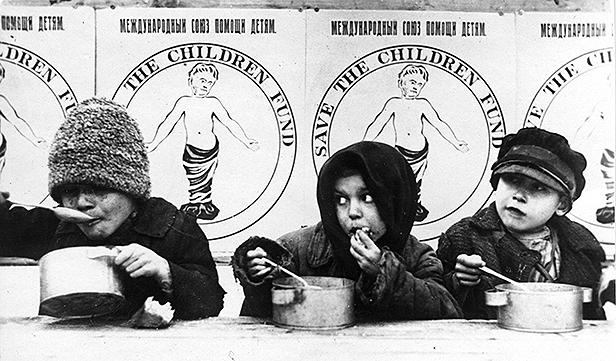
Figure 1.--Here we see Russian children being fed by Save the Children during the Russian Famine, probanly in 1921. |

|
World War I and the Russian Civil War resulted in a terrible fanine in Russia. The Russian famine threatened millions. American Relief officials offered to assist the Russians, but th Bolshevicks saw some advantage in fanine as it would eliminate anti-Bolshevik elements. Thus the assistance that flowed into Europe was denied to starving Russians. Save the Children founder, Eglantyne Jebb, saw that Save the Children could not be just a temporary post-World War I organization and must become a permanent organisation to fight for children's rights. [Nault, p. 7.] Jebb thus managed to change the organization's mission to an effort to save children whereever their lives are threatened by economic hardship and distress. Save the Children launched a press campaign, propaganda movies and feeding centers in Russia and in Turkey to feed thousands of refugees (1922-23). They also claim to have worked in education. We do not have details on this and suspect there wre real problems given Bolshevik and Islamic attitudes toward religion. Save the Children began to coordinate efforts with other organisations such as the Russian Famine Relief Fund and Nansen. The League of Nations recognized the effort. The major problem with coming to the aid of starving Russian children, pribarily because the Blosheviks wre using food as a weapon and did not want to admit that a famine could occur unfer their enlightened, soentific rule. Save the Children managed to persuade Bolshevik authorities to let them in to set up a ground presence. [Yates] Save the Children could only do so much. Britain had to import food and as essentially bankrupt after World War. Feeding the millions of starving Russians was beyond the capability of Save the Children or even Britain. But the breakthrough with Bolshevik authorities helped to break the Bloshevik resistance to allowing the American Relief Administration access to Russia. Lenin and other Bolsheviks were so shamed by the Save the Children publicity campaign that they finally aggeed to an ARA ground presence. As with aid to the ustrians and Germans after the War, aid to Bolshevik Russiansas also criticized.
The important Daily Express newspaper also criticised the Save the Children effort in Russia. They denied that the situation was as bad as portrayed and argued that Save the Children should be focused on needy children in Britain.
Breen, Rodney. "Saving enemy children: Save the Children's Russian Relief Organisation, 1921-1923". Disasters Vol. 18, No. 3. (1994), pp.221-237.
Nault, Jennifer. Save the Children (Weigl Publishers: 2003).
Yates. (2011).
Navigate the Children in History Website:
[Return to the Main Save the Children page]
[Return to the Main Charities page]
[About Us]
[Introduction]
[Biographies]
[Chronology]
[Climatology]
[Clothing]
[Disease and Health]
[Economics]
[Freedom]
[Geography]
[History]
[Human Nature]
[Ideology]
[Law]
[Nationalism]
[Presidents]
[Religion]
[Royalty]
[Science]
[Social Class]
[Bibliographies]
[Contributions]
[FAQs]
[Glossaries]
[Images]
[Links]
[Registration]
[Tools]
[Children in History Home]
